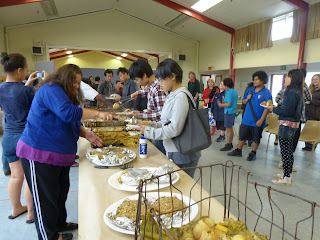Tena koutou katoa (Greetings
to you all)
On Monday afternoon Totara Village staff and students had
the opportunity to meet our manuhiri
(visitors), five Japanese Deaf students and three adults.
Introductions were shared: Yutaka Osugi (leader) Takashi
Shozaki (professional actor), Hanae Ochi (teacher of the deaf), five students
whose names were - Naoki Iwata, Ten Ohama, Kanae Oishi, Yuka Tsuji, Maika
Tanizawa.
Communications were a slight problem to start with. We were
able to get through a word at a time. Kaori
Kobayashi one of our Deaf teachers did a fantastic job being our translator. The Japanese were very lucky to also have a
dictionary translator (small electronic keyboard) to help us communicate, but
we were having fun determined to find ways to communicate!
Everyone had the chance to mix and mingle with our manuhiri and enjoyed sharing our dinner
with them. Afterwards Ava held an Activities Night where we shared each other’s
signs for five particular colours: red, green, black, blue and yellow. We were
split into three groups of five. The Japanese students showed us their signs
for the colours and we showed them our colours in NZSL. After a few laughs and
mistakes on the way, we were off to a fine start. We made the symbol for the
Olympic flag.
On Tuesday after school, our students were looking forward
to more activities with the Japanese students.
We were ready by 4pm and off to Mount Eden, where it was windy, which we
are used to. Some of the Japanese students thought it was very cold and windy. They
had warm clothes on but maybe not enough.
They took many photos like we did.
Next stop was Mission Bay where we got dropped off at Kelly
Tarlton’s and walked 2km around the water front to Mission Bay beach. Although
our students thought nothing of our windy waterfront, our visitors thought it
was quite cold. We encouraged them to run to warm up, which they did. Whether
it was the run or the trees blocking the wind, we all felt warm on Mission Bay
beach.
The fountain in Mission Bay was changing colours and the
Japanese were intrigued by it’s beauty. We all took more photos.
It was getting late for tea, so we went back to Kelston to
buy our fish’n’chips, then back to the Common Room with bread, butter and
tomato sauce. We showed our guests the real Kiwi
(New Zealand) way of eating fish’n’chips: without plates but using the paper
that was used to fold the chips in as our plate. We explained it is a very Kiwi tradition, fish‘n’chips and tomato
sauce. They had never seen sausages before! We encouraged them to try
fish’n’chips and sausages in the Kiwi way.
They enjoyed their yummy kai (food).
The next morning, before 5am, some of our students and most
of the Japanese students went to see how a hangi
(roasting pit in the ground) is prepared. They watched the adults setting up
the fire and putting the kai into the
pit when it’s hot enough.
The students
all looked so tired after their early morning, but agreed it is worth rising early
to enjoy such an experience. By lunchtime the hangi
was ready to eat.
We had quite a light dinner after the hangi for lunch. Then another kiwi favourite, ice cream and fruit
salad for desert, which was most popular among our Japanese visitors. We provided six different flavours of ice
cream so everyone found a flavour they enjoyed.
On Thursday after school, our students waited in anticipation
to meet up with our Japanese visitors. Homework and duties were forgotten as we
waited for our new friends to set up the Common Room for us. We were excited
yet sad because it was their farewell.
We stayed in the Common Room from 3pm to 10.30pm! All of the students
were tired but determined to be there and not miss this last evening with their
friends.
The Japanese visitors came with food galore, ‘Sushi’ and
‘miso’ soup which was delicious. Kanae
showed us how to make our own sushi wrap. We are all very fast learners and
eaters! It’s a shame we can’t have sushi
every night, but we can definitely have it once a week now we know how to make
our own!
We had our presentation after dinner, our Japanese friends
showed us their activities and how to paint our names on this special paper
that they use for writing which was a big ‘WOW’ for those not familiar with
their style of writing.
Finally we held poroporoaki
- our farewell speeches and presenting taonga
(special gift) to our visitors, some with mixed feelings and some sad.
We want to say “We have all enjoyed your company, and
learned a lot in such a small amount of time.
Thank you for sharing your culture, your language and your friendship
and aroha with us. You are all most welcome back anytime.
Kia kaha (Stand strong) Ka kite ano (See you later)









